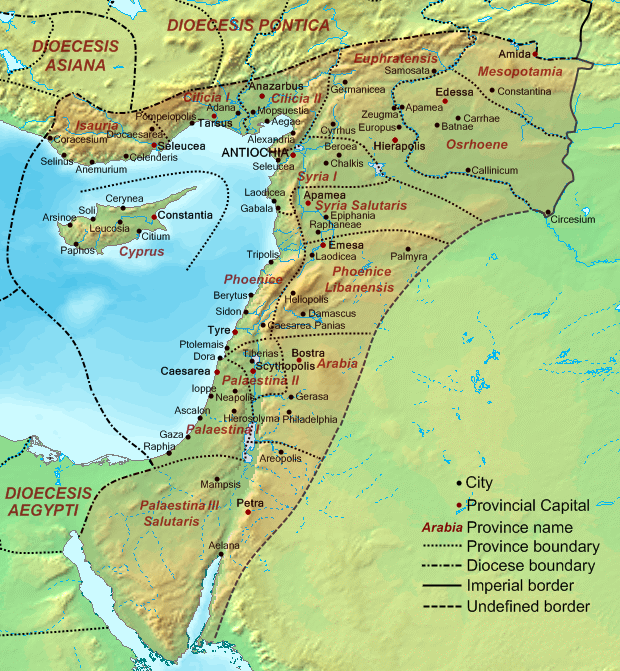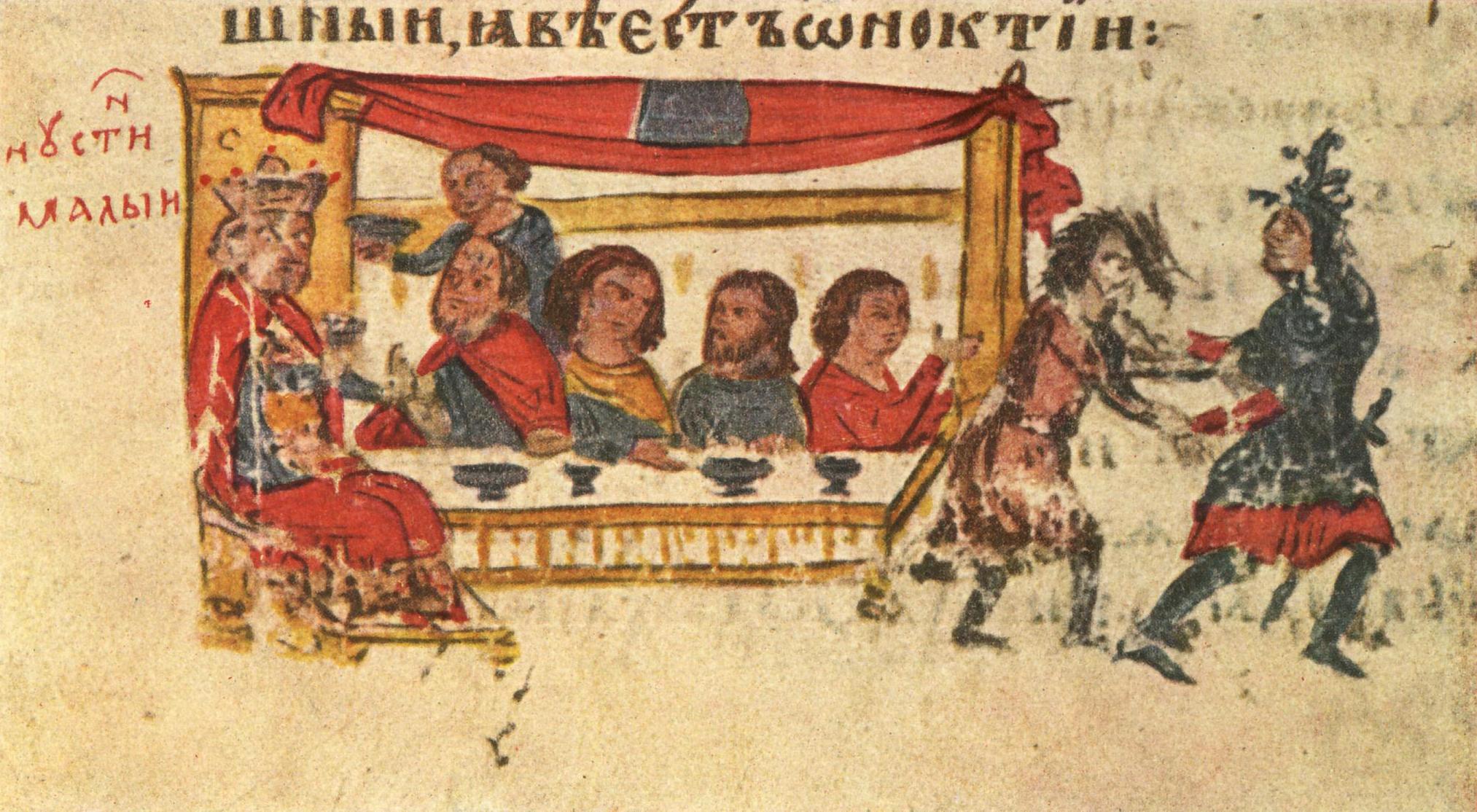|
Al-Mundhir III Ibn Al-Harith
Al-Mundhir ibn al-Ḥārith (), known in Greek language, Greek sources as (Flavios) Alamoundaros (), was the king of the Ghassanids, Ghassanid Arabs from 569 to circa 581. A son of al-Harith ibn Jabalah, he succeeded his father both in the kingship over his tribe and as the chief of the Byzantine Empire's Arab clients and allies in the East, with the rank of ''patrikios, patricius''. Despite his victories over the rival Sassanid Empire, Persian-backed Lakhmids, throughout Mundhir's reign his relations with Byzantium were lukewarm due to his staunch Miaphysitism. This led to a complete breakdown of the alliance in 572, after Mundhir discovered Byzantine plans to assassinate him. Relations were restored in 575 and Mundhir secured from the Byzantine emperor both recognition of his royal status and a pledge of tolerance towards the Miaphysite Church. In 580 or 581, Mundhir participated in an unsuccessful campaign against the Persian capital, Ctesiphon, alongside the Byzantine general ( ... [...More Info...] [...Related Items...] OR: [Wikipedia] [Google] [Baidu] |
Ghassanids
The Ghassanids ( ar, الغساسنة, translit=al-Ġasāsina, also Banu Ghassān (, romanized as: ), also called the Jafnids, were an Arab tribe which founded a kingdom. They emigrated from southern Arabia in the early 3rd century to the Levant region. Some merged with Hellenized Christian communities, converting to Christianity in the first few centuries AD, while others may have already been Christians before emigrating north to escape religious persecution. After settling in the Levant, the Ghassanids became a client state to the Byzantine Empire and fought alongside them against the Persian Sassanids and their Arab vassals, the Lakhmids. The lands of the Ghassanids also acted as a buffer zone protecting lands that had been annexed by the Romans against raids by Bedouin tribes. Few Ghassanids became Muslim following the Muslim conquest of the Levant; most Ghassanids remained Christian and joined Melkite and Syriac communities within what is now Jordan, Israel, Palesti ... [...More Info...] [...Related Items...] OR: [Wikipedia] [Google] [Baidu] |
Foederati
''Foederati'' (, singular: ''foederatus'' ) were peoples and cities bound by a treaty, known as ''foedus'', with Rome. During the Roman Republic, the term identified the ''socii'', but during the Roman Empire, it was used to describe foreign states, client kingdoms or barbarian tribes to which the empire provided benefits in exchange for military assistance. The term was also used, especially under the empire, for groups of "barbarian" mercenaries of various sizes who were typically allowed to settle within the empire. Roman Republic In the early Roman Republic, ''foederati'' were tribes that were bound by a treaty (''foedus'' ) to come to the defence of Rome but were neither Roman colonies nor beneficiaries of Roman citizenship (''civitas''). Members of the Latini tribe were considered blood allies, but the rest were federates or ''socii''. The friction between the treaty obligations without the corresponding benefits of Romanity led to the Social War between the Romans, with a ... [...More Info...] [...Related Items...] OR: [Wikipedia] [Google] [Baidu] |
Al-Hirah
Al-Hirah ( ar, الحيرة, translit=al-Ḥīra Middle Persian: ''Hērt'' ) was an ancient city in Mesopotamia located south of what is now Kufa in south-central Iraq Iraq,; ku, عێراق, translit=Êraq officially the Republic of Iraq, '; ku, کۆماری عێراق, translit=Komarî Êraq is a country in Western Asia. It is bordered by Turkey to Iraq–Turkey border, the north, Iran to Iran–Iraq .... History Kingdom of the Lakhmids Al-Hirah was a significant city in pre-Islamic Arab history. Al-Hirah (4th-7th centuries) served as the capital of the Lakhmids, an Arab vassal kingdom of the Sasanian Empire, whom it helped in containing the nomadic Arabs to the south. The Lakhmid rulers of al-Hirah were recognized by Shapur II (309-379), the tenth Sasanian emperor. A particular Mār 'Abdīšo' was born in Maysan and moved to Ḥīrā after studying elsewhere under Mār 'Abdā. There he gained widespread respect as he built a monastery and lived a pious life. The ... [...More Info...] [...Related Items...] OR: [Wikipedia] [Google] [Baidu] |
Sergiopolis
Resafa ( ar, الرصافة Reṣafa), also sometimes spelled Rusafa, and known in the Byzantine era as Sergiopolis (in greek Σεργιούπολις, Σεργιόπολις, "city of Saint Sergius") and briefly as Anastasiopolis (Αναστασιόπολις, "city of Anastasius"), was a city located in the Roman province of Euphratensis, in modern-day Syria. It is an archaeological site situated southwest of the city of Raqqa and the Euphrates. Procopius describes at length the ramparts and buildings erected there by Justinian. The walls of Resafa, which are still well preserved, are over 1600 feet in length and about 1000 feet in width; round or square towers were erected about every hundred feet; there are also ruins of a church with three apses. Names Resafa corresponds to the Akkadian ''Raṣappa'' and the Biblical ''Rezeph'' (Septuagint; grc-koi, Ράφες), where it is mentioned in ; cuneiform sources give Rasaappa, Rasappa, and Rasapi. Ptolemy calls it ''Rhesapha'' ... [...More Info...] [...Related Items...] OR: [Wikipedia] [Google] [Baidu] |
Justinian (magister Militum Per Orientem)
Justinian ( la, Iustinianus, gr, Ἰουστινιανός, after 525–582) was an East Roman (Byzantine) aristocrat and general, and a member of the ruling Justinian dynasty. As a soldier, he had a distinguished career in the Balkans and in the East against Sassanid Persia. In his later years, he plotted unsuccessfully against regent and later emperor Tiberius II (r. 574–582). Biography Origins and early career Justinian was born in Constantinople sometime shortly after 525, the second son of Germanus, a cousin to the Emperor Justinian I (r. 527–565). He had an elder brother, Justin, and a sister, Justina, who married the general John... Justinian was first appointed to military command in 550, when he, together with his brother Justin, were to accompany their father in his expedition against Ostrogoth Italy. Germanus, however, died suddenly in autumn 550, before the army had left the Balkans, where it was assembling.. After this, Justinian and John (Germanus's son-in-l ... [...More Info...] [...Related Items...] OR: [Wikipedia] [Google] [Baidu] |
Syria
Syria ( ar, سُورِيَا or سُورِيَة, translit=Sūriyā), officially the Syrian Arab Republic ( ar, الجمهورية العربية السورية, al-Jumhūrīyah al-ʻArabīyah as-Sūrīyah), is a Western Asian country located in the Eastern Mediterranean and the Levant. It is a unitary republic that consists of 14 governorates (subdivisions), and is bordered by the Mediterranean Sea to the west, Turkey to the north, Iraq to the east and southeast, Jordan to the south, and Israel and Lebanon to the southwest. Cyprus lies to the west across the Mediterranean Sea. A country of fertile plains, high mountains, and deserts, Syria is home to diverse ethnic and religious groups, including the majority Syrian Arabs, Kurds, Turkmens, Assyrians, Armenians, Circassians, Albanians, and Greeks. Religious groups include Muslims, Christians, Alawites, Druze, and Yazidis. The capital and largest city of Syria is Damascus. Arabs are the largest ethnic group, and Mu ... [...More Info...] [...Related Items...] OR: [Wikipedia] [Google] [Baidu] |
Dioecesis Orientis 400 AD
In the Late Roman Empire, usually dated 284 AD to 602 AD, the regional governance district known as the Roman or civil diocese was made up of a grouping of provinces each headed by a ''Vicarius'', who were the representatives of praetorian prefects (who governed directly the dioceses they were resident in). There were initially twelve dioceses, rising to fourteen by the end of the 4th century. The term ''diocese'' comes from the la, dioecēsis, which derives from the grc-gre, dioíkēsis ('' διοίκησις'') meaning "administration", "management", "assize district", or "group of provinces". Historical development Tetrarchy (286-305) Two major reforms to the administrative divisions of the empire were undertaken during the Tetrarchy. The first of these was the multiplication of the number of provinces, which had remained largely unchanged since the time of Augustus, from 48 at the beginning of Diocletian's reign to around a hundred by the time of his abdication ... [...More Info...] [...Related Items...] OR: [Wikipedia] [Google] [Baidu] |
Gold
Gold is a chemical element with the symbol Au (from la, aurum) and atomic number 79. This makes it one of the higher atomic number elements that occur naturally. It is a bright, slightly orange-yellow, dense, soft, malleable, and ductile metal in a pure form. Chemically, gold is a transition metal and a group 11 element. It is one of the least reactive chemical elements and is solid under standard conditions. Gold often occurs in free elemental ( native state), as nuggets or grains, in rocks, veins, and alluvial deposits. It occurs in a solid solution series with the native element silver (as electrum), naturally alloyed with other metals like copper and palladium, and mineral inclusions such as within pyrite. Less commonly, it occurs in minerals as gold compounds, often with tellurium (gold tellurides). Gold is resistant to most acids, though it does dissolve in aqua regia (a mixture of nitric acid and hydrochloric acid), forming a soluble tetrachloroaurate anion. Gold is ... [...More Info...] [...Related Items...] OR: [Wikipedia] [Google] [Baidu] |
Justin II
Justin II ( la, Iustinus; grc-gre, Ἰουστῖνος, Ioustînos; died 5 October 578) or Justin the Younger ( la, Iustinus minor) was Eastern Roman Emperor from 565 until 578. He was the nephew of Justinian I and the husband of Sophia, the niece of the Empress Theodora, and was therefore a member of the Justinian dynasty. Justin II inherited a greatly enlarged but overextended empire, with far less resources at his disposal compared to Justinian I. Despite this, he strived to match his formidable uncle's reputation by abandoning the payment of tributes to the Empire's neighbors. This miscalculated move resulted in rekindling of war with the Sassanid Empire, and in a Lombard invasion which cost the Romans much of their territory in Italy. Family He was a son of Vigilantia and Dulcidio (sometimes rendered as Dulcissimus), respectively the sister and brother-in-law of Justinian. His siblings included Marcellus and Praejecta. With Sophia he had a daughter Arabia and possibly ... [...More Info...] [...Related Items...] OR: [Wikipedia] [Google] [Baidu] |
Qabus Ibn Al-Mundhir
Qabus ibn al-Mundhir (Arabic: قابوس ابن المنذر; in Greek sources Καβόσης, Kaboses) was the king of the Lakhmid Arabs from 569 to 573. His name is an Arabic form of the Persian name "Kavus", adopted under the influence of his Sassanid Persian overlords. He succeeded his brother 'Amr III ibn al-Mundhir (r. 554–569). Not much is known of his reign except that he suffered a heavy defeat at the hands of the rival Byzantine-sponsored Ghassanid tribe under Al-Mundhir III ibn al-Harith Al-Mundhir ibn al-Ḥārith (), known in Greek language, Greek sources as (Flavios) Alamoundaros (), was the king of the Ghassanids, Ghassanid Arabs from 569 to circa 581. A son of al-Harith ibn Jabalah, he succeeded his father both in the kingshi ... in 570. After his death, the Lakhmids were ruled by a Persian governor for a year, until Qabus' brother al-Mundhir IV ibn al-Mundhir (r. 574–580) ascended to the throne. References Sources * * * 6th-century monarchs in th ... [...More Info...] [...Related Items...] OR: [Wikipedia] [Google] [Baidu] |
Roman Consul
A consul held the highest elected political office of the Roman Republic ( to 27 BC), and ancient Romans considered the consulship the second-highest level of the ''cursus honorum'' (an ascending sequence of public offices to which politicians aspired) after that of the censor. Each year, the Centuriate Assembly elected two consuls to serve jointly for a one-year term. The consuls alternated in holding '' fasces'' – taking turns leading – each month when both were in Rome and a consul's ''imperium'' extended over Rome and all its provinces. There were two consuls in order to create a check on the power of any individual citizen in accordance with the republican belief that the powers of the former kings of Rome should be spread out into multiple offices. To that end, each consul could veto the actions of the other consul. After the establishment of the Empire (27 BC), the consuls became mere symbolic representatives of Rome's republican heritage and held very little ... [...More Info...] [...Related Items...] OR: [Wikipedia] [Google] [Baidu] |





